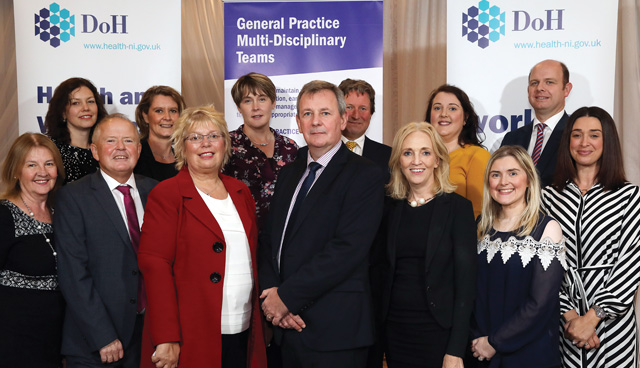MDTs in action

David Whelan visited Causeway Surgery in Newcastle, County Down to talk to GP Dr Lloyd Gilpin and Manager for mental health practitioners in the Down GP Federation, Shelley Keenan, about the realities of transformation under MDTs.
While still relatively new, Dr Lloyd Gilpin is in no doubt that the introduction of the full MDT team in his practice is already delivering better outcomes for service users and staff.
Recently Causeway Surgery has added to its existing staff of doctors, nurses and administrative staff with an advanced nurse practitioner and a practise-based pharmacist. Since September, this offering has been enhanced by the inclusion of a practice-based physio, mental health practitioner and social worker.
Discussing how transformation has impacted, Gilpin says: “The single most important element has been that all our practice-based professionals are first contact. We’ve handed control back to the patient and empowered them to access the professional most specialised to meet their needs.
“The Department of Health’s vision around transformation is not only to change the system in which we work but also how we think about health and wellbeing. At the moment we have a medical model whereby patients see a doctor because they are sick. In a transformed model we hope to reduce this number significantly by promoting the advantages of better health and wellbeing for communities in the form of prevention.”
Gilpin explains that such an approach will undoubtedly lead to better outcomes for service users, using the example of mental health, he says: “Previously where a patient presented to me with mental health needs my options were limited and usually centred on medication or secondary care referral. Now, a mental health practitioner can offer brief interventions or socially prescribe alternatives. However, they may also avail of a doctor or refer to a hospital. It’s not about stopping people going to secondary care, it’s about ensuring the right people are going to hospital.
“As with all of the new services, early intervention offers a greater opportunity to build resilience and prevention of the need for secondary care.”
Shelley Keenan, Manager for mental health practitioners in the Down Federation, says that the practice-based professionals will play an important role in breaking down the stigma attached with mental health care, a big pressure point in general practice and secondary care.
“I think there is a huge opportunity to normalise the care of our mental health and wellbeing through practice-based practitioners. There is a wide variety of circumstances ranging from patients presenting in crises to those who require a better understanding of their wellbeing, where having a focal point of contact within their local general practice will be beneficial to the service user.
“Such an approach will enhance a person’s ability to self-manage, allowing them to be better informed to manage their own wellbeing. There’s also an added benefit of breaking down the stigma associated with seeking help in mental health. Where previously someone may have been hesitant to approach their GP, the very existence of a mental health practitioner within a practice allows service users to recognise that they are not alone in the need for support.”
Gilpin says that having greater levels of expertise and a variety of this expertise in one location should not be overlooked in its importance. “GPs are not experts in everything and none of us are experts in all things. The ability to enquire, converse and refer patients to services that are co-located is hugely beneficial to outcomes for patients and reducing the number of patients being sent to hospital for additional care.”
Keenan explains that the benefits of the expertise of the MDTs is not limited to their speciality alone. “The health service is largely supported by the voluntary and community sector and there is a big role to play for that sector as the benefits of deprescribing become more obvious. However, navigating the various services and groups within communities is a difficult task for an individual.
“Co-location will allow for the sharing of information and resources in terms of the best pathways and services in social prescribing. It should also allow for more targeted interventions if there are particular problems facing a community. People who are supported in their surrounding community have better health outcomes.”
Both professionals are adamant that the transformation will provide better health outcomes for service users, but what difference will it have for those delivering the care?
Gilpin stresses that he can only speak from his own experience but paints a picture of an almost immediate easing of pressure for him in terms of time constraints. While by no means time rich, Gilpin states that he now has the opportunity to lengthen consultation timings for patients with more complex or demanding needs.
“The biggest difference has been that as patients become more aware of services available, then they have begun to use those services as a first point of contact, which has reduced the pressure on me and ultimately reduced the barriers to them getting the most suitable care at an earlier stage.”
Keenan explains that this earlier intervention is receiving a positive response from service users. “The feedback so far has been largely good and people are identifying that their needs are being met better and from a mental health point of view, they are no longer having to unnecessarily go through an assessment process in statutory mental health service.
“Again, the impact of co-located professionals within a community practice is much wider than direct treatment. We’re seeing that service users are feeling supported because they are having the processes explained to them. Even where secondary care is required, having a specialist professional as a first point of contact is helping to reduce anxieties and expectations around the secondary care pathway.”
While the early stages of the transformation roll out in the Down federation have been welcomed, challenges still remain. Most notably, that of budget given that initial transformation funding was received from outside of the Department of Health’s core expenditure. How the Department will fund the existing MDTs and its future ambitions to roll out across the whole of Northern Ireland has not yet been explained.
“However, they may also avail of a doctor or refer to a hospital. It’s not about stopping people going to secondary care, it’s about ensuring the right people are going to hospital.”
— Dr Lloyd Gilpin
However, Gilpin is confident that the money will be found. “As a joint project with the Trust we have an agreed budget and we have been assured that this budget is a priority for the Department. We’ve taken that assurance in good faith in employing staff and I have no reason to doubt that,” he says.

“I think there is a huge opportunity to normalise the care of our mental health and wellbeing through practice-based practitioners.”
— Dr Shelley Keenan
“It’s clear that the current system is broken and is too expensive to maintain in its current form. I’m very optimistic that an evaluation of the existing MDTs will show a dramatic improvement not just in better outcomes for patients and reduced hospital admissions but also as a more efficient service.”
Infrastructure
One area where Causeway Surgery has not been able to transform is around its premises. Recognised as a change likely to take much longer than the addition of services, Gilpin explains that many practices have had to be “inventive” in fitting in additional staff. While it is understood that longer-term plans will have to be made to modify or create infrastructure to accommodate MDTs, he explains a situation whereby the potential benefits of additional practice-based professionals far outweighed any potential delays that would have necessary, if the rollout was paused until infrastructure was in place.
Another challenge that exists is around staffing and acquiring the level of skills needed to initiate a MDT within a federation. Concerns have been raised that the opening up of positions in primary care could be damaging to professional availability at secondary care level. While the Down Federation have not found it difficult to attract the relevant staff, other federations such as Derry, who have MDTs initiated, have flagged challenges.
Both professionals outline good working relationships and collaboration with the Trust to ensure that there is no negative impact to the delivery of care. They also highlight a recognition for the need to increase training numbers to accommodate need, including the potential wider rollout of MDTs.
Keenan concludes: “Through our working relationships, there is a wider recognition that additional resources in primary care will have a long-term benefit and reduce the number of people attending secondary care. We’re already seeing a positive impact even at this early stage.”





